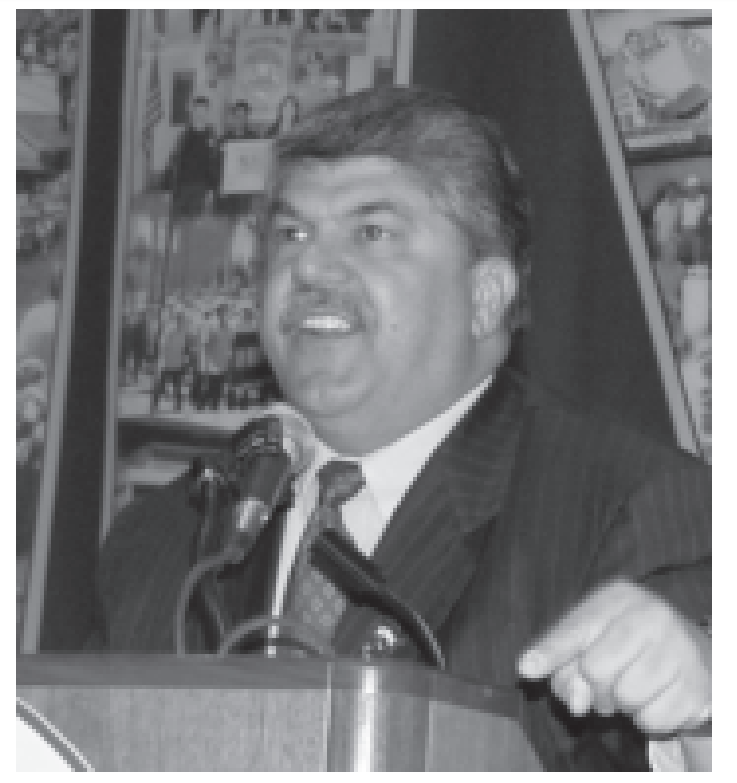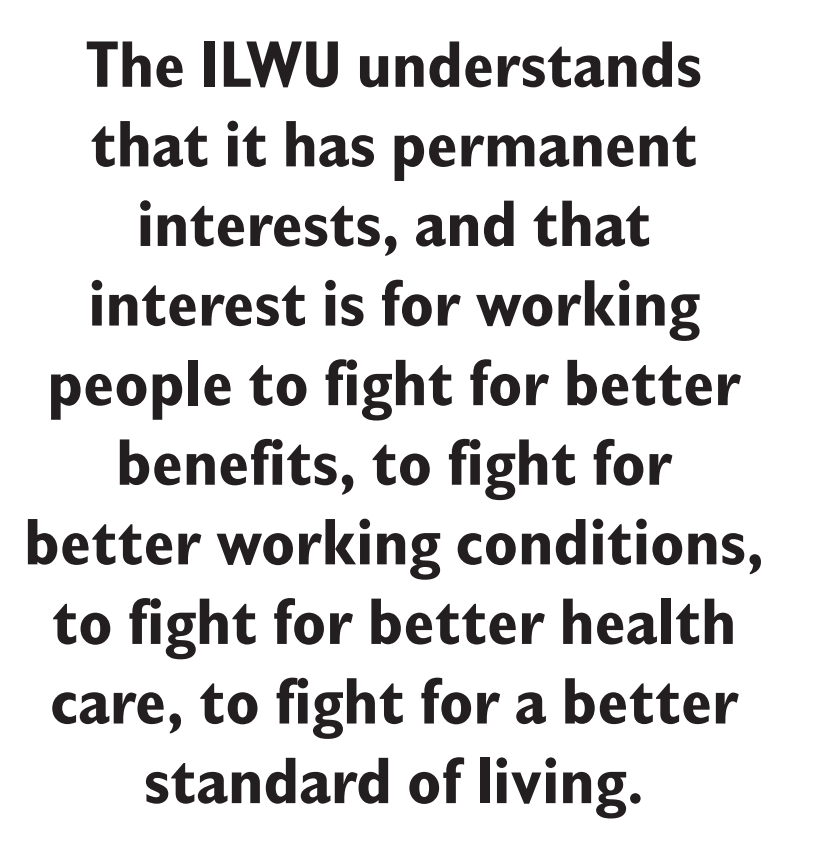We have a chance this year to turn our country around because voters are discovering the truth about George W. Bush and his way of life and everything that they stand for.
They are learning that he is as incompetent as his administration is corrupt. You see, he failed to win victory in Iraq or make a plan for peace. He failed to track down terrorists. He failed to save our airlines, steel industries, and our manufacturing sector. He failed to create enough jobs. He failed to control the budget deficit. He failed to control the trade deficit. He failed to deliver a prescription drug program benefit that actually works. He failed to bring gasoline and heating oil prices under control. He failed to bring down health care costs. He failed to bring health care to 45 million American workers. And all the while he failed, he aided and abetted the attacks on our pensions, on our health care, on our jobs, on our wages, on our unions. He rewards and encourages the outsourcing of our jobs and the security of our country.

Labor and our allies can take back control of our federal government by asking voters of all political persuasions one simple question, “Have you had enough?”
That is the question that I ask all of you today and that you in turn have to ask your members every day between now and November. “Have you had enough?” When you see them at work, you ask them, “Have you had enough?” When you see them in church or on the streets in town, “Have you had enough?” When we see them at the store you ask them, “Have you had enough?”
Have you had enough of a corporate policy box which is collapsing the middle class and stealing the future of workers? Have you had enough? Have you had enough of working harder and harder and harder for less and less and less so that corporations can make more money and CEO’s can steal more money? Have you have had enough? Have you had enough of the corporate lobbyists like Jack Abramoff and corporate criminals like Wilbur Ross and Haliburton pulling the strings of our elected officials and controlling our government? Have you had enough? Have you had enough of our retirees and our widows losing their pensions after years and years and years of suffering and bleeding and dying and losing their health care? Have you had enough?
Have you had enough of children going without health care and the education that they deserve? Have you had enough? Have you had enough of immigrant workers and American workers and Canadian workers and union workers being treated like second-class citizens? Have you had enough?
Have you had enough? Well, then, let’s get together—let’s stand together, let’s fight together, let’s vote together! Let’s kick their asses together because we have had enough! ◆
We need unions now more than ever
Those are the concrete ways in which we all are capable of using ourselves individually and collectively in supporting action. As someone once said, it’s not only action, but vision, because action without vision is chaos. Today more than ever we need action with vision in order to bring us clarity in what we need to do as we move forward in the 21 st Century.
A great labor leader who fought for 25 years to establish this union, a sleeping pullman car worker, A. Philip Randall, once said, “We have no permanent enemies, we have no permanent friends, but we have permanent interests.”
The ILWU understands that it has permanent interests, and that interest is for working people to fight for better benefits, to fight for better working conditions, to fight for better health care, to fight for a better standard of living. That is’the role that the ILWU has played.
I stand here because I stand on the shoulders of men and women who supported the ILWU along the way. Paul Robeson supported the ILWU. Harry Belafonte supported the ILWU. My dear friends Ollie Davis and Ruby Dee supported the ILWU, supported the work of unions.
We need unions more than ever now at this particular junction as we move into another age, an age in which energy costs go up, an age in which people are beginning to turn more and more back into the city as a place in which they inhabit, live, and raise their kids. They need a safe city. They need a safe community. They need jobs that pay living wages, not the wages that hotel workers receive in New Orleans. Not those wages, not $7 an hour, but living wages, wages with which they can raise a family and not have to work two and three jobs, and benefits which include health care for their children.
Unions have played that role historically, and that role becomes more evident and more important today. Unions have played that role. Because when we talk about raising the standard of living, unions have always talked about programs that got you out of the poverty program. Unions have always raised the level of what we as workers are due and what we receive. They have always fought for that and they must fight for that more than ever.
As we see an increase in profits within all industries, the service industry, the manufacturing industry, unions playa critical role at this particular time. We need to bring more people to the union. We need to build the constituency. We need to build the voice of union workers. And by building the voice of union workers, we build the voice of all workers.

This is going to take the proactive legacy that you are steeped in. This is going to take the proactive and imaginative action from which you were established. This is not a complex vision. This is a vision centered around justice. It is a vision centered around a dream. It is a vision centered around creating a world which is equitable for all of us. That is your vision. You can never lose sight of that vision. You can never lose sight of that mandate.
It is a mandate that struggles for the rights of women. It is a mandate that struggles for the rights of minorities. It is a mandate that tells us that w_ are in a very real sense brothers and sisters and that we each are our brother’s keeper.’ That is the mandate that you service — a mandate that embraces pragmatism, a mandate that embraces’ past struggles.
You are a manifestation of that. Everything you have gotten, every victory you have achieved has been a struggle, a struggle you have embraced. Every single loss that you suffer, every single battle that you lose is not a loss to one person, it is a loss to all workers. All workers lose when you lose. And all workers win when you win.
In this new 21 st Century, where oil prices are rising, serviceable public transportation has to be our calling. Not just what we call for, what we ask for and what we demand. In this new place, we become a little bit closer to each other. We need to become closer to each other. You are going to playa very important role in fabricating that, not only for you right here, this moment, but for the future of your children and grandchildren. It’s an enormous calling. It’s an extraordinary moment. I know you will stand up to the task and you will be there. You have been there in the past and you will be there in the future.
My parents worked for the post office more than 30 years. More than 30 years. When they worked for the post office for more than 30 years, they had a good health care plan that I was a beneficiary of. They had good benefits which my father retired on. They had a living wage in which they could aspire to the middle class dream, the American dream of middle class.
We have to bring that back. It is our responsibility to bring that back for ourselves, for our children, and for those generations to come.
It doesn’t take a rocket scientist—it really doesn’t—to figure this out. We can talk about all kinds of statistics and strategies around profit, about all the theories around markets. But there is something in that discussion that cannot be reduced, that cannot be ignored. What cannot be reduced is those who don’t care about what happens to human beings, what happens to children, what happens to those who work all their lives and who then retire. We cannot be reduced to forgetting about that. Nomatter what the market strategies, whatever the market theories, whatever the current economic theories are, we cannot be reduced to believing that all of this is natural science. This is not natural science. This is about what human beings do and how human beings transform themselves or not transform themselves, how human beings themselves act and decide what is important. If life and the preservation of life is important, then that is what we have to elevate. Not the preservation of profits, not the preservation of evil-spiritedness, not the preservation of inhumanity. We have to hold on to the preservation of people. And unions do that. Unions talk about the people and they do that. ◆
